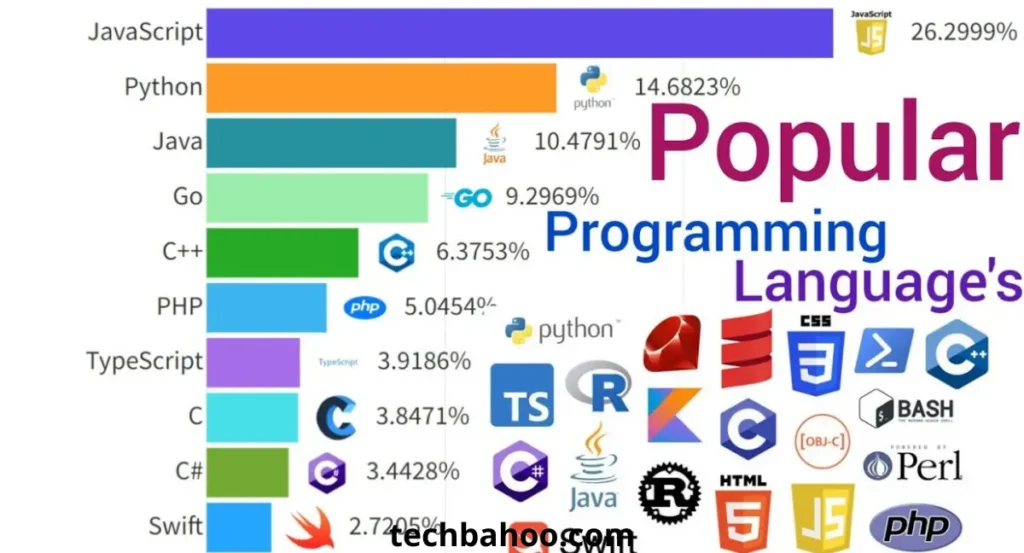Speed in software development isn’t just about writing code fast—it’s about how quickly that code executes. The fastest programming languages define the backbone of systems that run our digital world—from supercomputers crunching data to mobile applications responding in milliseconds.
In today’s competitive tech space, developers in the USA value both performance and efficiency when choosing the right tool for the job.
When we talk about the fastest programming language, we dive into how well a compiler or interpreter converts source code into executable machine code. The execution time, compile-time, runtime, and optimization all shape how a program performs.
Some languages are compiled languages, which means they’re translated directly into machine code before running—making them incredibly fast.
Others are interpreted languages, which are read line-by-line, often introducing slight delay. Below, we’ll explore a detailed comparison of the top fastest programming languages, from Pascal to the ever-dominant C.
Top Fastest Programming Languages

The performance of a programming language depends on its compiling and execution process. Compiled languages like C, C++, and Rust directly translate to machine code, offering near-instant execution speed.
Interpreted languages such as Python or PHP rely on an interpreter to scan and convert instructions at runtime, making them slower by design.
When comparing execution efficiency, it’s crucial to consider the optimization strategies used by compilers. For instance, Just-In-Time (JIT) compilers in languages like Java and Julia optimize code on the fly, balancing runtime flexibility with compile-time speed.
Below is a simple table illustrating how high-level languages differ in processing and execution.
| Language Type | Conversion Method | Execution Speed | Examples |
| Compiled Languages | Converts source code into executable machine code before running | Very Fast | C, C++, Rust, Pascal |
| Interpreted Languages | Executes line-by-line through interpreter | Slower | Python, PHP, JavaScript |
| Hybrid Execution | Combines compilation and interpretation | Medium to Fast | Java, Julia, C# |
This blend of speed, security, and code efficiency defines which language tops the charts. Let’s dive into the list of the top fastest programming languages and understand why they lead in performance and execution time.
10. Pascal
Pascal is a procedural, high-level programming language known for its structured syntax and statically typed nature. Designed for teaching good coding habits, Pascal still holds a position among the faster programming languages.
Its compiler produces efficient machine code across Windows, macOS, UNIX, and Linux, ensuring consistent execution speed.
In real-world comparison, Pascal’s simplicity makes error checking at compile time straightforward, minimizing runtime delays. Despite being decades old, it’s still used for embedded systems and industrial control programs due to its speed and efficiency.
9. F#
F# is an open-source, cross-platform programming language that runs on the .NET framework. It’s often used for web applications, mobile applications, data science, and cloud development.
Built for both functional and object-oriented programming, F# achieves speed through its compiler that produces native optimized code.
Developers appreciate F# for its asynchronous code execution and ability to handle parallel processing efficiently. Its performance often comes close to C#, placing it among the best high-speed languages in modern computing environments.
8. C#
C# is a general-purpose, multi-paradigm programming language designed for web applications, mobile applications, AR, VR, and web services. Built on the .
NET platform, it features a robust garbage collector and memory management system that enhance program execution.
Although C# depends on the .NET runtime, its JIT compilation process and runtime optimization make it faster than most interpreted languages. C# also offers hybrid execution through AOT (Ahead-Of-Time) compilation, improving speed for performance-critical systems while maintaining developer-friendly functionality.
7. Java
Java is a versatile object-oriented language known for its balance between speed and reliability. It runs on the Java Virtual Machine (JVM), which compiles source code into bytecode, making it platform-independent.
The Java interpreter, class loader, and bytecode verifier ensure that Java programs execute securely and efficiently across various operating systems.
Although Java can be slower than C++ or C, its runtime optimization and JIT compilation significantly reduce execution time.
As GeeksforGeeks and the Java Programming Foundation course suggest, beginners can build strong foundations in Java and progress to complex applications with confidence under mentors like Sandeep Jain.
6. Ada
Ada is a static, high-level, object-oriented, and concurrent programming language designed for reliability and speed. It’s widely used in aviation, military, and aerospace systems due to its built-in security features and error-checking mechanisms.
Ada compilers detect bugs during compilation, preventing runtime errors and improving overall efficiency.
Many studies highlight Ada’s reliability, making it one of the fastest yet safest languages for mission-critical systems. Its focus on performance, reliability, and security places it high on the list of efficient programming tools.
5. Julia
Julia is a high-level, high-performance, dynamic programming language built for applications, microservices, and multiple platforms.
Its JIT compiler translates source code directly into machine code, delivering fast execution without compromising readability.
What makes Julia stand out is its ability to integrate easily with Python, R, and C, offering the best of both dynamic and compiled languages.
These design decisions make Julia ideal for data science, numerical computing, and machine learning, proving that a dynamic language can rival traditional compiled languages in speed.
4. Fortran
Fortran remains a general-purpose language but dominates in scientific calculations and numerical programming. It’s widely used in supercomputers for its unmatched computation performance.
Despite its age, Fortran compilers are optimized for data reading, writing, and processing, allowing it to remain a faster language compared to newer counterparts.
Its consistent performance ranking in benchmarks proves that Fortran is still among the top fastest programming languages, especially for heavy scientific and numerical tasks that demand maximum speed and efficiency.
3. Rust
Rust is an efficient, modern, and fast programming language known for security, memory safety, and performance. Built as a safer successor to C, Rust eliminates common vulnerabilities like buffer errors without sacrificing execution speed.
Its zero-cost abstractions and ownership model ensure that programs execute quickly while avoiding runtime crashes.
Many competitive programmers prefer Rust because it combines speed, security checks, and modern syntax.
It’s frequently compared to C++ for execution speed, yet provides safety layers that make it a reliable choice for system-level programming.
2. C++
C++ remains one of the fastest languages in the world. It’s efficient, powerful and used by competitive programmers for high execution speed. The Standard Template Library (STL) and compiler optimizations make it ideal for complex applications.
While C++ shares vulnerabilities like buffer errors, modern compilers include security checks to tackle these issues.
As Geeks for Geeks Programming Foundation notes, mastering C++ basics—like input/output, operators, and loops—is essential for building optimized programs. Though slower in learning curve, C++ remains a favorite for its unmatched performance and control.
1. C
At the top of the list, C stands as the fastest programming language. Its assembly-level instructions are mapped closely to machine code, resulting in extreme speed without heavy abstraction. C allows direct memory manipulation, making it perfect for operating systems, embedded systems, and device drivers.
However, its simplicity comes with vulnerabilities. Buffer errors, unsafe operations, and lack of security layers can cause issues if developers aren’t careful. Still, its execution speed, efficiency, and cross-platform capability make C the foundation of modern computing.
As GeeksforGeeks Programming Foundation courses highlight, studying C basics—such as flow control and input/output—lays the groundwork for mastering any future language.
Conclusion
Speed remains the crown jewel of programming. While C, C++, and Rust dominate in raw execution performance, newer languages like Julia and F# show that dynamic tools can match compiled languages through smart optimization. Choosing the best programming language depends on your goals—whether you need real-time processing, scientific computation, or secure system development.
FAQs About Fastest Programming Language
1. What is the fastest programming language?
The fastest programming language is usually C or C++. They run close to machine code and give top performance.
2. Why are C and C++ so fast?
C and C++ are fast because they are compiled, not interpreted. They give full control over memory and hardware.
3. Is Python a fast language?
No, Python is slower. It runs line by line, which makes it less efficient than C++ or Rust.
4. Which language is best for high-performance computing?
C, C++, and Fortran are best for high-performance computing. Rust is also becoming popular for its speed and safety.
5. How do I pick the fastest language for my project?
Pick C or C++ for raw speed. Choose Rust for safety. Use Python or JavaScript if you want fast development.











